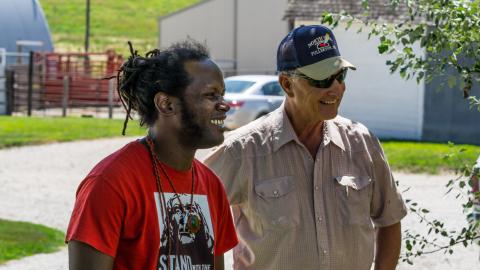- storytelling and public interventions
- local organizing around climate and social justice solutions
- silo-busting movement gatherings.
Around the world, the manifesto – and the process behind it – is serving as a model for how to build new alliances and powerful momentum around a just transition. In the United States, organizers from the Bernie Sanders campaign are exploring it as a path to engage a generation of supporters with a progressive platform that is not attached to an individual candidate or party. It has inspired the Scandinavian Green Manifesto for Europe, as well as sister Leap initiatives in Australia and the U.K. More than 500 people gathered at a workshop at COP21 in Paris on taking The Leap global. Back in Canada, local Leap groups and networks of workers, teachers, and students for The Leap are springing up as people adapt the manifesto locally and use it to drive intersectional campaigns.
Start by adding your name to the 15 original demands.
And then – if you’re inspired – host a meeting, join an existing group, or start a campaign: the Leap Manifesto is an open-source organizing tool, waiting to be localized by you, in your community.
We start from the premise that we’re facing the deepest crisis in recent memory.
The Truth and Reconciliation Commission has acknowledged shocking details about the violence of Canada’s near past. Deepening poverty and inequality are a scar on the country’s present. And Canada’s record on climate change is a crime against humanity’s future.
These facts are all the more jarring because they depart so dramatically from our stated values: respect for Indigenous rights, internationalism, human rights, diversity, and environmental stewardship.
Canada is not this place today— but it could be.
- The leap must begin by respecting the inherent rights and title of the original caretakers of this land, starting by fully implementing the United Nations Declaration on the Rights of Indigenous Peoples.
- The latest research shows we could get 100% of our electricity from renewable resources within two decades; by 2050 we could have a 100% clean economy. We demand that this shift begin now.
- No new infrastructure projects that lock us into increased extraction decades into the future. The new iron law of energy development must be: if you wouldn’t want it in your backyard, then it doesn’t belong in anyone’s backyard.
- The time for energy democracy has come: wherever possible, communities should collectively control new clean energy systems. Indigenous Peoples and others on the frontlines of polluting industrial activity should be first to receive public support for their own clean energy projects.
- We want a universal program to build and retrofit energy efficient housing, ensuring that the lowest income communities will benefit first.
- We want high-speed rail powered by just renewables and affordable public transit to unite every community in this country – in place of more cars, pipelines and exploding trains that endanger and divide us.
- We want training and resources for workers in carbon-intensive jobs, ensuring they are fully able to participate in the clean energy economy.
- We need to invest in our decaying public infrastructure so that it can withstand increasingly frequent extreme weather events.
- We must develop a more localized and ecologically-based agricultural system to reduce reliance on fossil fuels, absorb shocks in the global supply – and produce healthier and more affordable food for everyone.
- We call for an end to all trade deals that interfere with our attempts to rebuild local economies, regulate corporations and stop damaging extractive projects.
- We demand immigration status and full protection for all workers. Canadians can begin to rebalance the scales of climate justice by welcoming refugees and migrants seeking safety and a better life.
- We must expand those sectors that are already low-carbon: caregiving, teaching, social work, the arts and public-interest media. A national childcare program is long past due.
- Since so much of the labour of caretaking – whether of people or the planet – is currently unpaid and often performed by women, we call for a vigorous debate about the introduction of a universal basic annual income.
- We declare that “austerity” is a fossilized form of thinking that has become a threat to life on earth. The money we need to pay for this great transformation is available — we just need the right policies to release it. An end to fossil fuel subsidies. Financial transaction taxes. Increased resource royalties. Higher income taxes on corporations and wealthy people. A progressive carbon tax. Cuts to military spending.
- We must work swiftly towards a system in which every vote counts and corporate money is removed from political campaigns.
From students at Historically Black Colleges and Universities who drafted their own manifesto, to farmers in Nebraska who have come together to launch a regenerative revolution in agriculture, to our recent partnership with Los Angeles City Council members on an intersectional, justice-based approach to making L.A. fossil free by 2025, more and more people are showing they’re ready to Leap into the future we want.
Click here if you're ready for a US Leap Manifesto.
Thanks to co-founder Naomi Klein’s summer best seller, No Is Not Enough , and her tour last June, we’ve had a surge of energy and momentum to help build the "YES" across North America. My goal is to connect your passion and energy for transformative change with the projects and issues The Leap is tackling in real time.
On that note, have you seen our new platform for sharing stories yet?
Now, here are the headlines as promised:


Spread the word